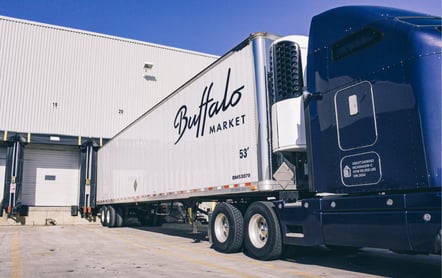Helium for Logistics: How Blockchain is Changing the Industry
The logistics industry has undergone a massive transformation in recent years.
The killer combination of the eCommerce boom, a global pandemic, a rising population, and changing lifestyle habits has placed new demands on the logistics industry. These demands have triggered a race to adopt new technologies and paradigms that can help logistics companies handle the increased volume of shipments, new demand chains, and faster delivery times.
One major new player is Helium, the so-called "People's Network." Read on to learn how Helium is democratizing wireless connectivity among IoT devices and changing the way the supply chain handles logistics.

What is Helium?
Helium is a blockchain-based network that enables wireless and long-range communication between IoT devices. The Helium Network is intended to provide an energy-efficient, low-cost connection for Internet of Things (IoT) devices like sensors and trackers
Helium blockchain rewards hotspot hosts with HNT tokens/cryptocurrencies after they confirm network transactions and new blocks for the blockchain. This incentivizes them to deploy and maintain a network of wireless gateways known as Helium Hotspots.
Helium operates with an open-source IoT network based on public LoRaWAN access points.
Why is Helium so important for logistics?
Since 2016, Helium blockchain has been adopted more and more by companies worldwide, including companies offering logistics services. Why? For any business to thrive, it must protect all its assets to avoid losses. That's especially true for logistics.
Helium blockchain, with over 715,000+ (and growing) Helium Hotspots, makes it easier than ever to track companies' assets.
Asset tracking
When you've got valuable truckloads of property crisscrossing the country, it's more than a little helpful to know where your said trucks might be at any given point in time.
Helium-enabled trackers use LongFi (think WiFi with a much, much, much longer reach) to stay connected to the internet no matter where they happen to be, this way live tracking information can be uploaded and stored in the blockchain where sender, shipper, and receiver can all keep tabs on it whenever they wish.
That brings us to our next point:
Secure data sharing and communication.
Shipments often change hands, and whenever they do, the parties involved document the exchange and keep it for record. The problem with that is not everyone has the same record-keeping system or indeed the same level of diligence. Human error, accidental loss or destruction—possibly even purposeful malfeasance—can result in inaccurate records.
Fortunately, data uploaded to the Helium blockchain is immutable and freely accessible, meaning shippers, receivers, and everyone in between can verify logistics information independently and that the information cannot be altered. This fosters trust and accountability.
See our explainer on blockchain to learn more about how the tech behind it works to create what is often described as an immutable digital ledger.
 To minimize data overload
To minimize data overload When shipping products from one location to another, you have to record the shipment each time it changes hands between its origin and destination.
Especially when dealing with a huge inventory, record duplication adds up fast, can be cumbersome, and wastes resources. With Helium, logistics companies can neatly and efficiently store transactional data on the blockchain.
The Helium Network is a suitable solution for supply chain management because it allows companies to monitor the entire supply chain in real time.
This is especially important when it comes to sourcing. You might be surprised to find out how difficult it can be to find out where, say, a shipment of chocolate or produce was originally sourced.
This eliminates fraudulent practices and ensures that goods originate from legal, ethical sources.
Blockchain technology has made it possible for companies to process many transactions at once without waiting longer than one second between transactions.
Helium also helps to make sure that all transactions can be processed as quickly as possible, making it possible for companies to spend less time processing orders and more time on customer service calls and payments.
Location trackers and sensors that detect conditions such as temperature or humidity can help logistics companies quickly identify errors or inefficiencies in their operations and rectify them.
Factors that make Helium's logistics capabilities useful
Affordable Coverage
The Helium network provides cheaper and more reliable coverage for all users.
Anyone can access the network to operate low-power IoT gadgets with Helium Hotspots, whether for resource and fleet management or asset tracking. The hotspot connectivity covers longer distances and comes at a lower price than normal cellular networks.
Helium's infrastructure helps customers track their orders more efficiently in real-time because they don't have to rely on third parties or intermediaries anymore – they only have access to records stored on the Helium blockchain.
Offers more compatibility
Like many other blockchain networks, Helium comes with its own management platform—called Console.
With Console, you can register, authenticate, and manage your Helium-enabled devices.
The web browser-based platform speeds up the transfer of information from IoT devices to the internet and gives users the ability to manage their devices as well as monitor data transfers and connectivity costs.
Can help build brand loyalty
Customer loyalty is among the most important elements in building a brand. Businesses must live up to their customers' expectations and never fail to deliver on their promises to acquire and maintain loyal customers. For instance, late deliveries made by logistics companies may not only make them incur losses but also lose the customers for good.
Thankfully, Helium is here to help companies with just that.
Helium logistics and tracking technology help assure consumers their goods will reach their destination within stipulated time frames. The trackers come with numerous configured device parameters that can be linked to apps that monitor shipments. Some of these apps come with additional tools that allow communication with customers appraising them on how their delivery is going in real-time. With such tools, a company will surely acquire and maintain loyal customers.
How Buffalo Market uses Helium for food distribution
As a food distributor, Buffalo Market is keenly aware of the historical lack of transparency in the industry and how it leads to frustration and disappointment. That’s why one of the primary tenets of Buffalo Market’s business philosophy is to be as transparent as possible, both internally with our team members and externally with our retail and CPG partners.
Using Helium sensors and blockchain technology, Buffalo Market helps foster trust between ourselves and our clients and provides better service based on reliability and accountability.
To learn more about the retail practices that work in 2022 and beyond, check out the rest of the Buffalo Market blog or contact us today!
See an interview between Buffalo Market co-founder Sean Howell and Helium's Jacob Swinn here.




